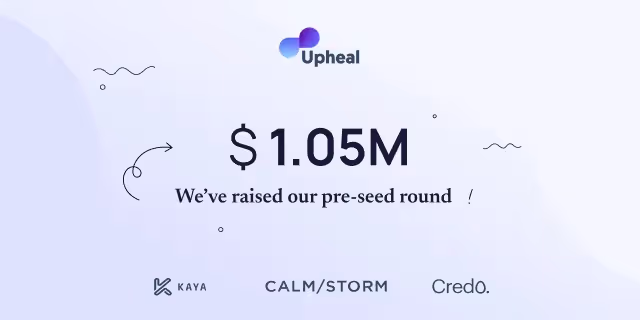Best scheduling software for therapists [2026]
![Best scheduling software for therapists [2026]](https://cdn.prod.website-files.com/6328c07d72b05347cc236c49/68dd9ec5bed62445286b78b3_Best%20scheduling%20software.avif)
Scheduling software affects more than just your calendar. It touches every part of your practice: how clients book appointments, how you manage your time, whether you can actually leave work at a reasonable hour.
The challenge is figuring out which platform will actually work for your specific practice without creating new headaches. HIPAA compliance is non-negotiable, but beyond that, your needs depend entirely on your practice structure, client population, and how you work.
This guide examines eight scheduling approaches used by mental health professionals, focusing on what each does well and where it falls short.
Comparing scheduling platforms
Therapy scheduling software falls into two categories:
- comprehensive practice management systems that bundle scheduling with clinical documentation and billing
- dedicated scheduling tools that do one thing well — calendaring
Neither approach is inherently better. Your choice depends on whether you want an integrated system or prefer specialized tools that work together.
About Calendly: It cannot legally be used for patient scheduling due to HIPAA non-compliance. Any scheduling software handling protected health information requires Business Associate Agreements and healthcare-grade security.
SimplePractice
SimplePractice serves over 225,000 practitioners with integrated practice management combining scheduling, documentation, billing, and telehealth.
The platform represents the current standard for comprehensive therapy practice software, particularly for clinicians who want everything in one place.
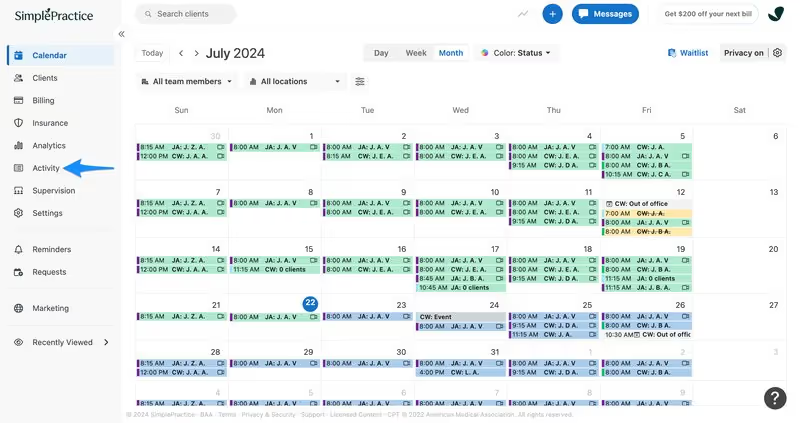
When SimplePractice works well
SimplePractice excels when you need modern functionality without managing multiple systems. The scheduling includes automated reminders, client self-service portals, and calendar synchronization that actually works reliably.
The interface design prioritizes user experience. Clients can book, reschedule, and complete intake forms through an intuitive portal. Therapists manage appointments through drag-and-drop interfaces that handle complex scenarios like recurring appointments and multi-provider coordination.
Their AI Note Taker generates session summaries and treatment plans directly from therapy sessions. This represents genuine innovation in clinical documentation, though understandably raises privacy questions worth considering carefully.
SimplePractice's limitations
Cost and complexity can overwhelm solo practitioners. Monthly expenses range $39-$99 before adding AI features at $35/month per clinician. This makes SimplePractice one of the more expensive options.
The breadth of features requires significant setup time. Some practitioners report that the comprehensive system makes simple scheduling tasks unnecessarily complex, particularly when transitioning from simpler methods.
The platform works best when you'll use most of its features. If you primarily need scheduling, paying for unused billing and documentation tools may not make financial sense.
Upheal
Upheal combines AI-powered clinical documentation with modern scheduling capabilities, representing next-generation software that understands therapy.
With over 70,000 therapists trusting Upheal today, we're building together with clinicians to help reduce administrative tasks and improve your workflow.
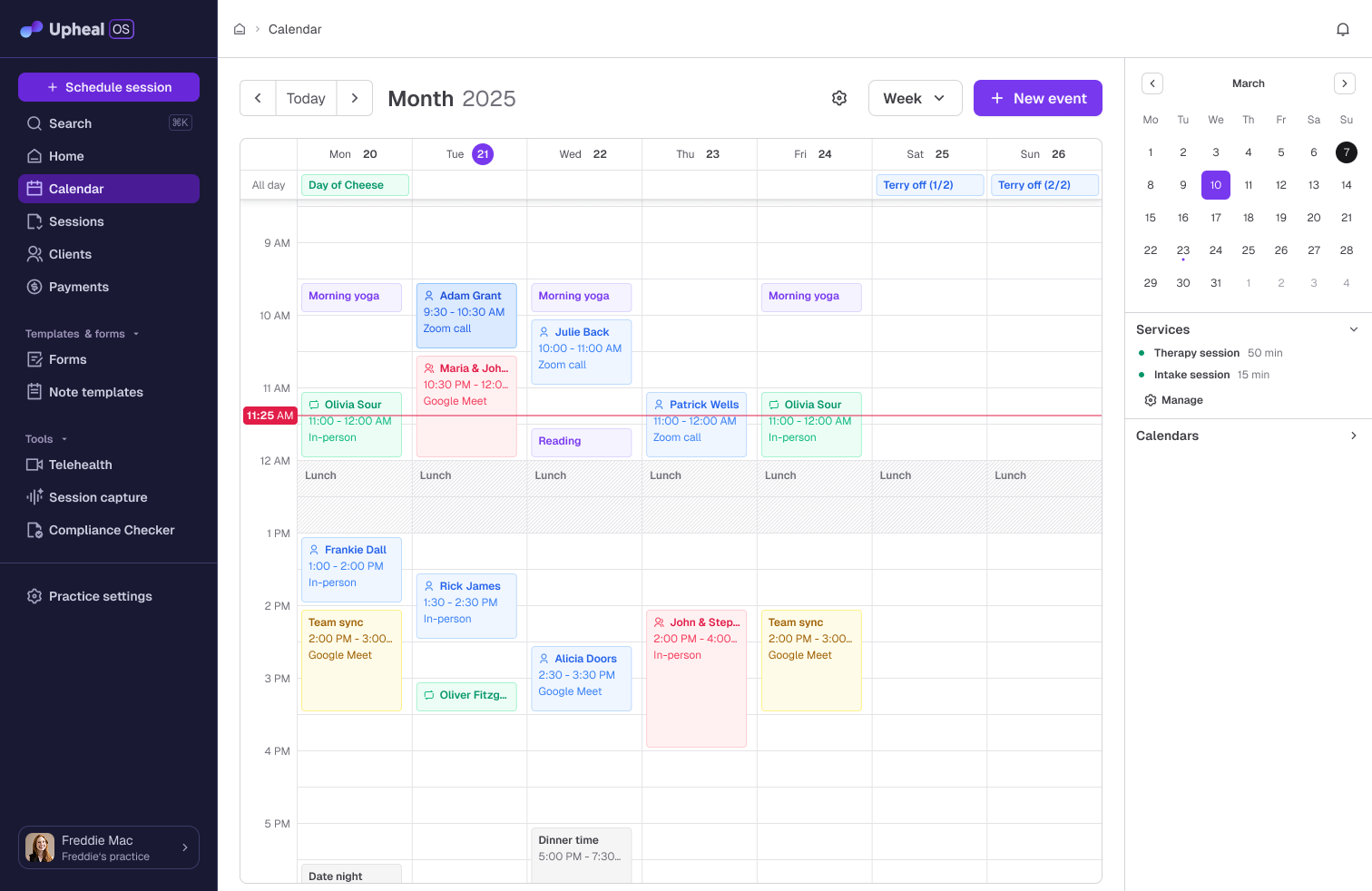
When Upheal works well
Upheal's AI capabilities transform scheduling from administrative tool into clinical intelligence platform. Automated progress notes, treatment plan generation, and session analytics with emotional tracking provide insights traditional systems cannot offer.
Integrated video conferencing with HIPAA-compliant recording enables seamless telehealth delivery while AI transcription captures session content for automated documentation. This reduces administrative overhead typically associated with therapy scheduling.
Flexible pricing from free basic features to $69/month unlimited sessions accommodates practices at different growth stages, making advanced AI capabilities accessible to solo practitioners and large groups. Growing integrations with platforms like Alma and Headway streamline existing workflows.
Upheal's evolving capabilities
We're actively building features therapists tell us they need. Client self-scheduling is coming soon as we focus on creating genuinely intuitive booking experiences rather than rushing incomplete features to market.
As a newer platform, some features remain in development compared to established solutions with years of refinement. We're transparent about this — and, early adopters help shape features that actually serve clinical needs rather than checking software boxes.
TherapyNotes
TherapyNotes specializes exclusively in behavioral health, serving over 60,000 mental health professionals with scheduling designed specifically for therapy workflows.
The platform prioritizes clinical functionality over modern aesthetics, focusing on features that directly support therapeutic practice.
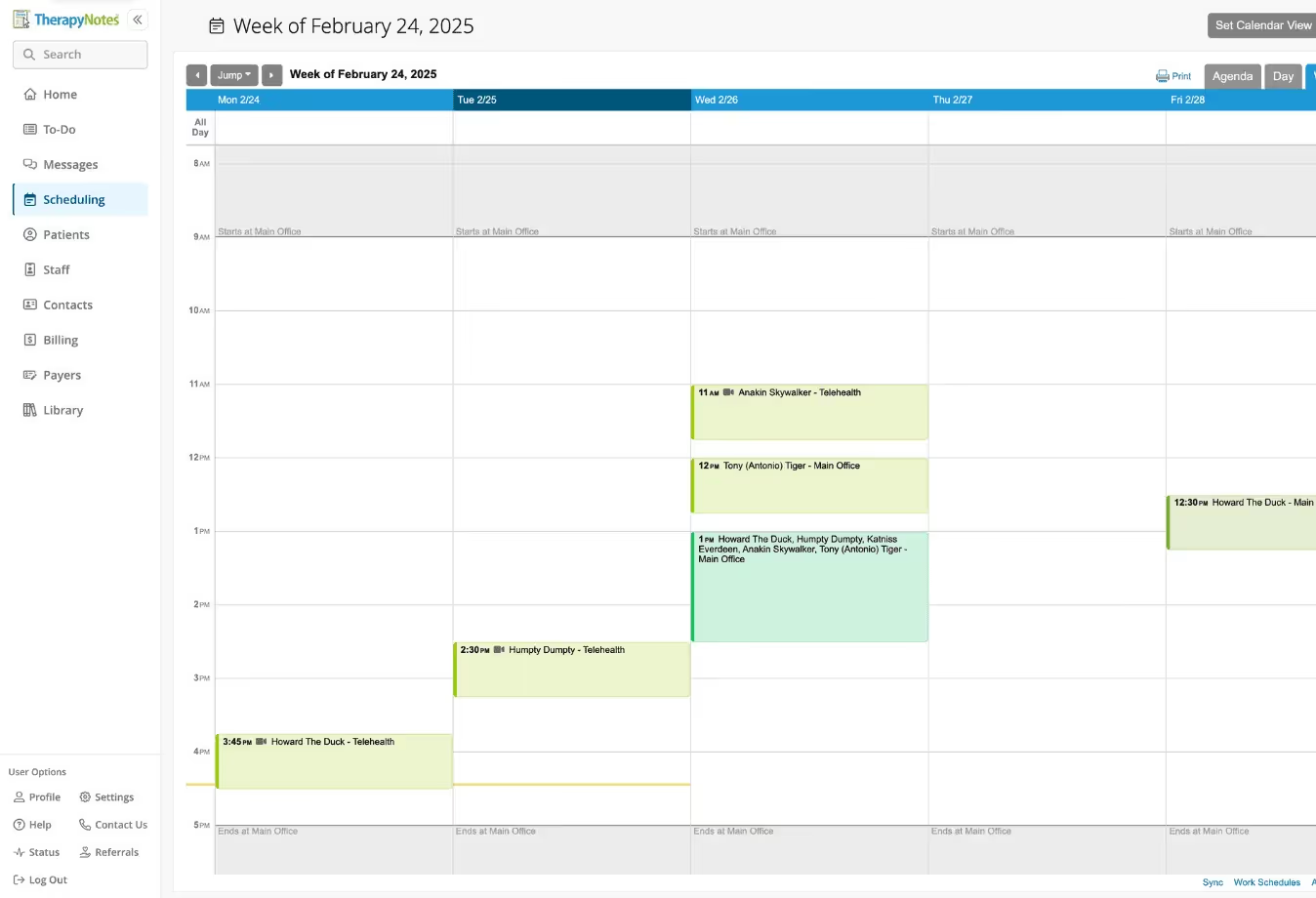
When TherapyNotes works well
TherapyNotes understands therapy-specific scheduling challenges. Their Quick History Review provides instant access to previous session data during scheduling, enabling informed decisions about session frequency and treatment planning.
The platform handles structured clinical workflows effectively, with specialized templates for different therapeutic modalities. Multi-location support manages complex practice arrangements, while integrated billing connects scheduling directly to insurance processing.
For practices prioritizing clinical workflow efficiency over interface design, TherapyNotes delivers functionality that matters.
TherapyNotes' limitations
Limited mobile functionality represents a significant constraint. TherapyNotes lacks dedicated mobile applications, offering only mobile-responsive web interfaces that compromise efficiency when working outside traditional office settings.
Client self-scheduling requires manual approval, creating administrative steps that automated systems eliminate. This particularly affects practices serving tech-comfortable clients who expect immediate booking confirmation.
The interface reflects older development approaches. While functionally effective, the design feels dated compared to contemporary platforms emphasizing modern user experience.
Ensora Health
Formerly TheraNest, Ensora Health targets mental health professionals with HITRUST-certified security exceeding standard HIPAA requirements.
Their client-based pricing model ($42-81/month per therapist based on client volume) offers economic advantages for specific practice configurations.
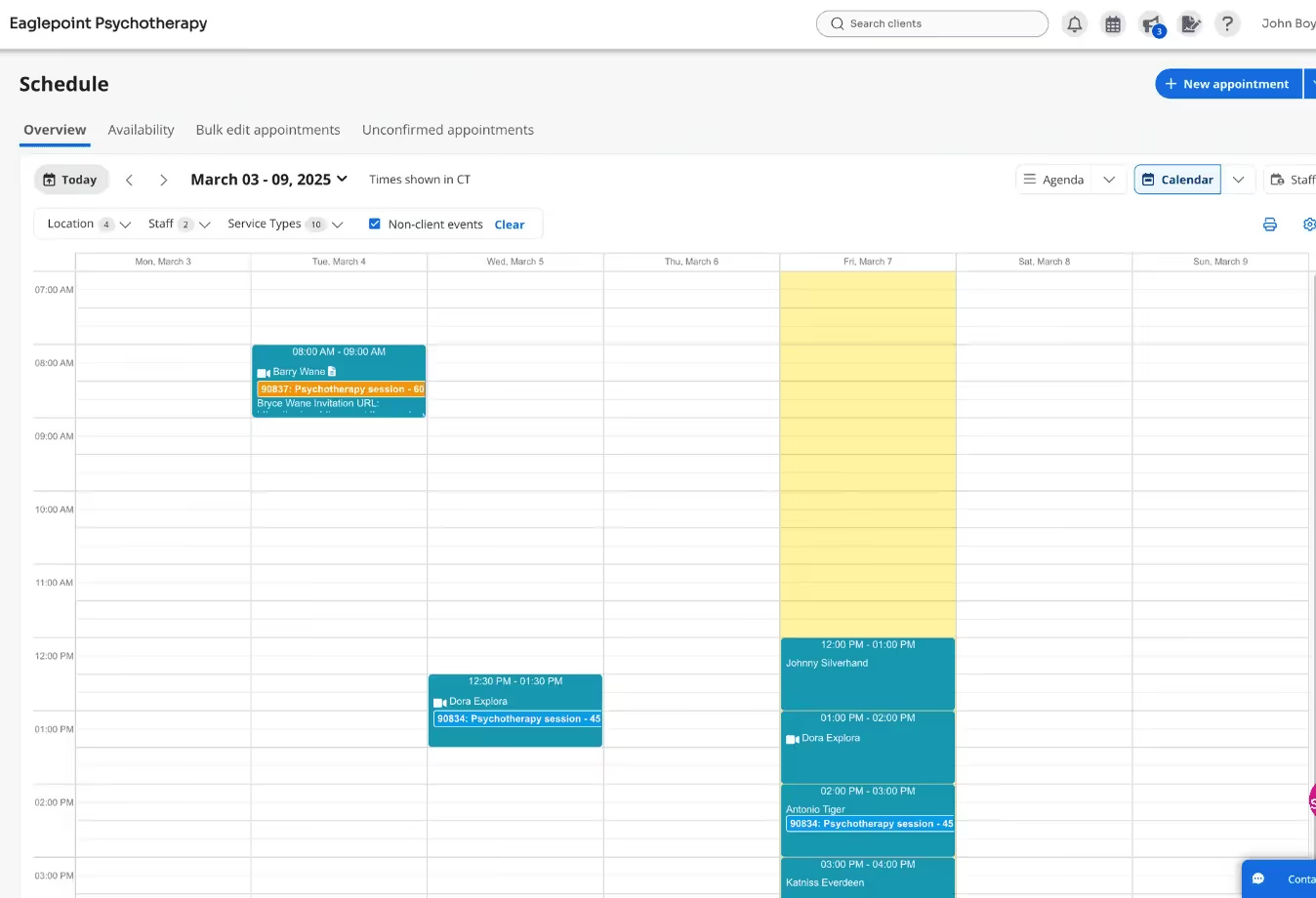
When Ensora Health works well
Ensora Health's HITRUST certification provides the highest available security standards. This advanced compliance appeals to practices handling sensitive populations or operating in highly regulated environments.
Unlimited users benefits larger practices significantly. Group practices with high administrative-to-clinical ratios avoid per-provider pricing penalties, potentially saving substantially compared to per-user models.
Upcoming AI enhancements promise automated treatment plan suggestions and clinical decision support, positioning Ensora Health for technological advancement while maintaining security priorities.
Ensora Health's limitations
Client-based pricing becomes expensive for practices with low client-to-provider ratios. Solo practitioners or small groups may find per-client costs exceed traditional per-provider pricing, particularly during growth phases.
The mental health focus, while advantageous for specialized practices, limits versatility for multi-disciplinary clinics. Integration with non-mental health systems may prove more complex than generalist platforms.
Recent rebranding from TheraNest created temporary confusion and feature disruptions as the platform transitions infrastructure.
Jane
Jane serves over 40,000 practitioners across multiple healthcare disciplines with exceptional customer support and month-to-month flexibility uncommon in healthcare software contracts.
Their Canadian origins bring unique international compliance capabilities.
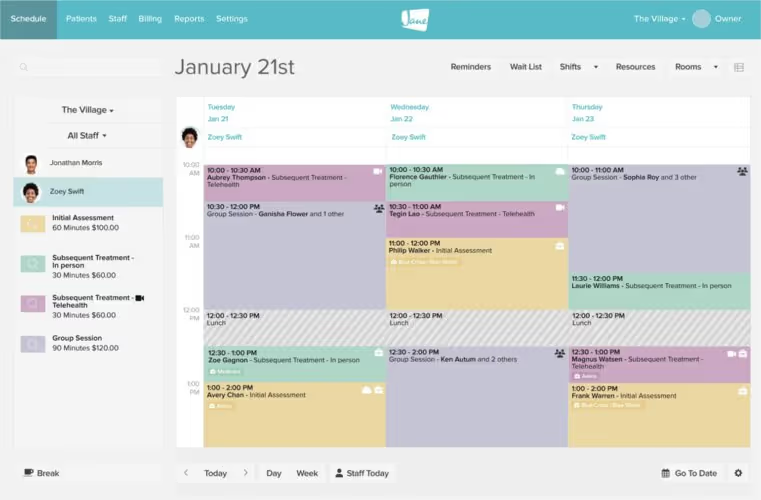
When Jane works well
Jane's interdisciplinary approach handles complex scheduling involving multiple service types, provider specialties, and billing structures. Automated waitlist management intelligently fills cancellations, while 99.99% uptime ensures reliability during critical periods.
Unlimited phone, email, and chat support with free data migration eliminates implementation barriers. Personal account managers provide ongoing optimization assistance, shifting adoption from technical challenge to strategic practice development.
Transparent pricing in Canadian dollars ($54-99+ CAD monthly) includes all core features without hidden fees, enabling accurate budget planning.
Jane's limitations
Limited mental health-specific features compared to therapy-focused platforms. While functionally comprehensive, Jane lacks specialized tools like treatment plan integration or therapy-specific billing codes.
No native practitioner mobile application forces reliance on web-based interfaces that may compromise efficiency for therapists requiring mobile access. This particularly affects practices with multiple locations or community-based service delivery.
Canadian market focus may create currency exchange considerations and support hour misalignments for US-based practices, though these rarely affect core functionality.
CounSol.com
CounSol.com provides comprehensive practice management with extensive customization and dedicated account managers. Users report pricing stability since 2014, offering remarkable cost predictability in an industry known for annual increases.
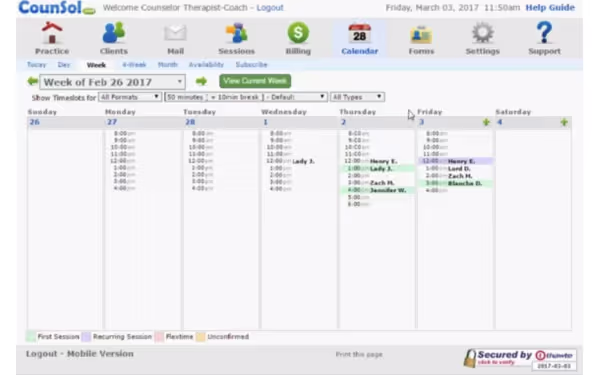
When CounSol.com works well
White-glove onboarding includes dedicated account managers who understand individual practice workflows and configure scheduling specifically for your operational requirements. This personalized approach eliminates generic implementation challenges.
Unlimited custom forms and complete branding control enable practices to maintain professional identity throughout client scheduling experiences. Complex workflow configurations support specialized therapeutic approaches that generic platforms cannot accommodate.
24/7 support with established personal relationships provides immediate assistance during scheduling emergencies, distinguishing CounSol.com from platforms offering only ticket-based service.
CounSol.com's limitations
Interface design reflects early web development aesthetics. While functionally complete, the visual presentation feels outdated compared to contemporary platforms emphasizing modern user experience.
No dedicated mobile applications limit scheduling flexibility for therapists working outside traditional office environments. Mobile browser functionality provides basic access but lacks optimized experience.
Higher per-user costs ($35-45 monthly for additional counselors) make CounSol.com expensive for larger practices, particularly compared to unlimited-user pricing models.
Acuity Scheduling
Acuity Scheduling represents the only pure scheduling tool legally suitable for therapists, requiring their Premium plan ($49/month) for essential HIPAA compliance and Business Associate Agreements.
This platform focuses exclusively on appointment management without clinical documentation features.
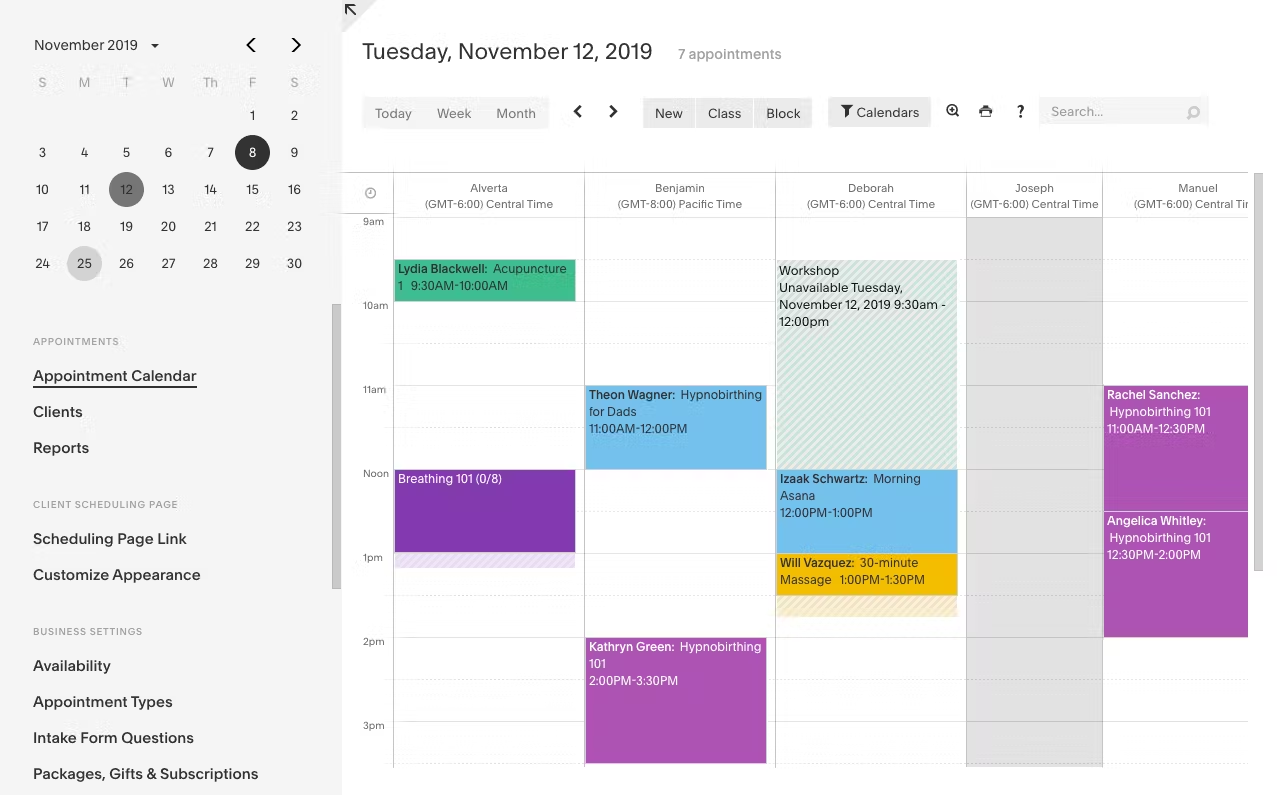
When Acuity Scheduling works well
Acuity's specialized scheduling capabilities exceed most comprehensive platforms in appointment management sophistication. Unlimited appointment types, advanced waitlist algorithms, and comprehensive client self-scheduling create exceptional booking experiences without clinical system complexity.
Strong integration ecosystem connects with existing clinical documentation systems, payment processors, and video conferencing platforms, enabling customized technology stacks around robust scheduling foundations.
Cost efficiency appeals to solo practitioners wanting professional scheduling without comprehensive practice management expenses. When combined with separate clinical systems, total costs often equal integrated platforms while maintaining specialized tool advantages.
Acuity Scheduling's limitations
No clinical documentation features require separate systems for treatment notes, progress tracking, and insurance billing. This creates workflow fragmentation that integrated platforms eliminate.
Higher learning curve compared to therapy-specific platforms designed with clinical workflows in mind. General business focus requires adapting features designed for broader service industries rather than healthcare-specific requirements.
Limited healthcare integrations compared to specialized therapy platforms may complicate connections with EHR systems, insurance verification services, and clinical assessment tools.
Paper calendar
Many experienced therapists still rely on paper calendars. No login issues, no subscription fees, no software updates breaking workflows. Just reliable, immediate access to schedules without digital complications.
When paper calendars work well
Paper calendars never crash, never require updates, and always work exactly as expected. For therapists who've experienced scheduling software malfunctions during busy clinic days, pen and paper offers genuine peace of mind.
Zero monthly costs make paper economically attractive, especially for solo practitioners managing tight budgets. No HIPAA compliance concerns about cloud storage or data breaches — schedules live safely in office filing cabinets.
The tactile experience of writing appointments helps some clinicians remember schedules better than digital interfaces. Color coding, sticky notes, and margin annotations provide customization rivaling sophisticated software.
Paper calendar limitations
Manual processes create significant administrative burden as practices grow beyond solo size. Double-booking becomes constant risk without automated conflict detection, while client communication requires separate systems for reminders and confirmations.
No client self-scheduling capability means every appointment requires phone coordination, limiting practice accessibility for clients preferring booking outside business hours. Telehealth integration is nonexistent, requiring separate coordination for remote sessions.
Backup plans consist of photocopying pages or manually entering appointments into digital formats. This complicates calendar recovery after coffee spills. Integration with billing systems, insurance verification, or treatment planning requires manual transcription between paper and digital systems.
Your scheduling choice impacts daily workflow
The scheduling platform you choose influences your practice's operational efficiency for years. This decision affects client satisfaction, revenue optimization, compliance requirements, and your professional quality of life more than most therapists initially realize.
The right scheduling software should eliminate administrative friction, not create new complexity requiring constant management. Professional therapy scheduling must handle HIPAA compliance, clinical workflows, and client communication standards that general business platforms simply cannot support.
Start by understanding your specific scheduling requirements before evaluating platforms. Your future self — and your clients — will appreciate the strategic approach to selecting scheduling software that genuinely serves your therapeutic mission rather than complicating it.
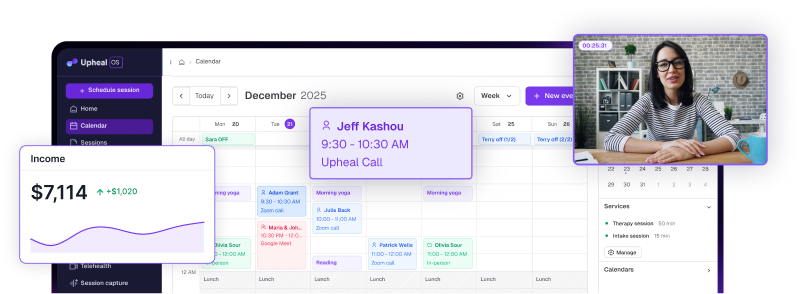








.avif)

